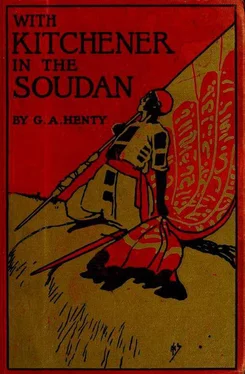"You will find it a great advantage," one of them said to him. " Of course times may arrive when you will have to leave it behind, but as a rule there is no trouble about it at all. You hire a native driver, who costs practically nothing, and he keeps with the baggage; no one asks any questions, and when you halt for a day or two you have comforts. Of course with a British regiment you are cut down to the last ounce, but with us it is altogether different. There being only three or four white officers to each regiment, the few extra camels in the train make no appreciable difference. Besides, these black fellows consider it quite natural and proper that their white officers should fare in a very different way from themselves, whereas a British Tommy would be inclined to grumble if he saw his officers enjoying luxuries while he himself had to rough it."
As the horse only cost three pounds and the camel only five, Gregory's store of money was not seriously affected by the purchases. For both animals, although in poor condition from their journey from Kordofan, a fortnight's rest and good feeding did wonders. Zaki had not much to do, but Gregory was well satisfied with the selection he had made. He looked after and groomed the horse, saw that the native with the camel took care of it, and went down regularly to the river to water it every evening, while he himself did the same with the horse. He always had a jug of cold tea ready for Gregory whenever he came in, and the floor of the tent was kept scrupulously clean. Zaki's only regret was that he could not do more for his master, but he was consoled by being told that the time would soon come when he would be more actively engaged.
From the first day of his arrival Gregory was kept fully employed. Sometimes he assisted the officer of the Intelligence Department in interviewing fugitives who had arrived from Berber and other points on the river, from Kordofan, or from villages on the White Nile. Sometimes he carried messages from the General to the officers in command of the two Egyptian brigades. He had to listen to disputes between natives returning to their homes from which they had been driven by the Dervishes and those they found in possession of their land. He took notes of the arguments on both sides, and submitted them to the General for his decision. The work would have been trifling in any other climate, but was exhausting in the sweltering heat of the day, and he was not sorry when the sun sank and he could take off his khaki tunic and go down to the river for a swim.
One evening, as they were sitting after dinner, General Hunter said: "It is very annoying that while these natives making their way down the country are able to tell us a good deal of what is taking place on the Nile from Omdurman down to Metemmeh, and while we also get news of the state of things at Berber and Abu Hamed, we know nothing whatever of Mahmud's intentions, nor indeed anything of what is doing at Metemmeh itself since it was captured by the Dervishes and, as we heard, the whole population destroyed. Of course Mahmud has the choice of three courses. He can stay where he is, he can march his whole force to Berber, or he can advance against us here. I don't suppose that he has any idea of the progress the railway is making from Wady Haifa. He may have heard, and no doubt he has heard, that we are making a road of some sort across the desert in the direction of Abu Hamed, but of the capabilities of the railway he can form no idea, and may well believe that the march of an army across what is practically a waterless desert is a matter of impossibility.
"On the other hand, he knows that we are gathering a considerable force here, and, with his limited knowledge, doubtless supposes that we are going to cross the Bayuda desert to Metemmeh as the Gordon relief column did; or that, if we are not coming that way, we intend to follow the river bank up to Berber. Unquestionably his best course, if he considers, as we may be sure he does, that the force under his command is strong enough to crush us here, would be to push across the desert and fall upon us before reinforcements arrive. But it is reported, and I believe truly, that the Khalifa, his father, has positively refused to let him do so; still, sons have disobeyed their fathers before now.
"There is, it is true, the difficulty of water; but that is not so serious in the case of a Dervish force as it is with us. In the first place, they can march twice as far as we can; in the second place, they are accustomed to go a long time without water, and are but little affected by the heat. Lastly, they have nothing to carry except their weapons, a few handfuls of dates, and their water-gourds. Still, we know that the forces that have one after another arrived here have been greatly weakened by the journey. However, Mahmud may attempt it, for he must know from his spies here, that we have at present no such land transport as would be required were we intending to advance across the desert. He may therefore move at least a portion of his force to Berber, trusting to the fact that, even did we make an advance south from here with the intention of cutting off his retreat to Khartoum, he would be able to reach Metemmeh before Ave could get there.
"Undoubtedly, a British general, if commanding a force constituted as Mahmud's is, would make a dash across the desert and fall upon us, unless indeed he felt certain that after the difficulties we encountered last time we attempted to take the desert route, we should be certain to advance by the river step by step, continuing the policy that we have followed since we began to push forward from Assouan. Mahmud is in a very difficult position. He is controlled by his father at Khartoum. Among those with him are many important Emirs, men of almost equal rank with himself, and he could hardly hope that whatever decision he might personally arrive at would be generally accepted by all; and those who opposed him would do so with all the more force as they could declare that in making any movement he was acting in opposition to his father's orders. However, our total ignorance as to Mahmud's plans and intentions is most unfortunate; but it can hardly be helped, for naturally the natives coming down from Kordofan give Metemmeh a very wide berth. As to sending up any of the natives here to find out what is going on, it is out of the question, for they would be detected at once, as their language is so different from that of the Baggara."
Later on the General retired to his quarters. Gregory went there. "Can I speak to you for a few minutes, sir?" he asked.
"Certainly, Mr. Hilliard. What can I do for you?"
" I have been thinking over what you were saying regarding information as to Mahmud's intentions. With your permission I am ready to undertake to go into his camp, and to find out what the general opinion is as to his plans."
" Impossible, Mr. Hilliard! I admire your courage in making the offer, but it would be going to certain death."
"I do not think so, sir. I talk Baggara better than the negro dialect that passes here. It is among the Baggara that I am likely to learn something of my father's fate; and as the old nurse from whom I learnt these languages had been for a long time among that tribe, she devoted, at my mother's request, more time to teaching me their Arab dialect than any other, and I am convinced that I could pass unsuspected among them as far as language is concerned. There is no great difference between Arab features and European, and I think that when I am stained brown and have my head partly shaved, according to their fashion, there will be little fear of my being detected. As to costume, that is easy enough. I have not seen any of the Dervishes yet, but tha natives who have come in from El Obeid or any other neighbourhood where they are masters, could give me an account of their dress, and the way in which they wear the patches on their clothes, which are the distinguishing mark of the Mahdists."
Читать дальше












